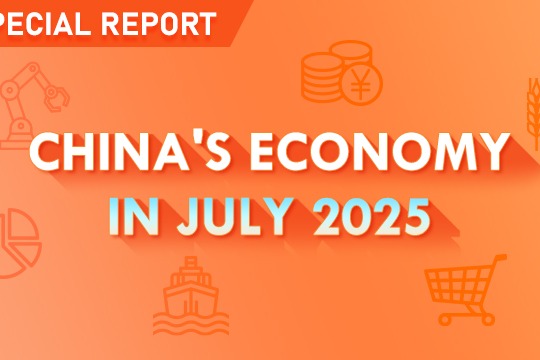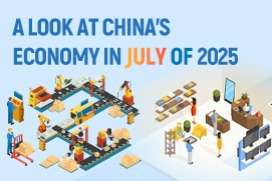HSBC's chief Asia economist: China-Japan parallels overplayed


Editor's note: As the Chinese economic recovery accelerates, China Daily is talking with chief economists at international financial institutions, to gauge their confidence in the Chinese economy and their forecast for its operation in 2023 and beyond.
Here is the latest interview with Frederic Neumann, chief Asia economist and co-head of Global Research Asia at HSBC.
Q: With recent measures to address the property market downturn and boost confidence in the capital market and the private economy, what's your outlook for the Chinese economy for the rest of the year and 2024? Has the Chinese economy bottomed out and when may economic growth pick up?
A: China's economy has likely bottomed out, with growth showing signs of picking up. Already in August, green shoots in the economy have become visible. For example, manufacturing new orders expanded, and there are signs that the inventory overhand in manufacturing has started to fade. This should bring stronger manufacturing output in the coming months. Accelerated local government bond issuance since mid-year should also help to propel infrastructure spending, providing a partial offset to still-sluggish housing construction.
It is important to keep the pace of recovery in perspective. However, given lingering drags on the economy, notably from exports and housing, the recovery will likely prove relatively gradual in the coming quarters. The emphasis will remain on quality growth, rather than the overall speed of growth.
Q: Is China entering a period of deflation and what could be the consequences? How do you see the fundamental reasons for the challenge of insufficient demand in China's economy? What would be the appropriate policy responses that can address insufficient demand without aggravating structural problems, such as debt and asset price bubbles?
A: China has certainly very low inflation, especially in the global context where many economies over the past two years grappled with soaring price pressures. However, it would be wrong to describe China as being in the grip of a deflationary spiral. Underlying demand is still growing and we haven't seen the emergence of a deflationary mindset among producers and consumers. From this perspective, the slowdown in inflation is merely a typical response to the cyclical slowdown in the Chinese economy. Still, vigilance is required: a prolonged period of demand weakness could lead to supply outstripping demand on a structural basis, which would exacerbate deflation risks. From this perspective, it is essential that final demand grows in equal proportion to the supply capacity of the economy.
Stimulus measures that are designed to raise investment, without supporting demand structurally, may ultimately raise deflation risks. China is not in this situation yet, but the risk cannot be entirely discounted. For this reason, recent efforts to lift consumer spending point in the right direction. But this is not about a short-term spending surge, but rather about laying the foundation for long-term, strong demand growth. Here, efforts to strengthen the pension system, offer more educational opportunities, and improvements in healthcare services should all help to raise demand growth over time by reducing incentives for excess saving among households. Ultimately, economists look to these types of structural reforms to strengthen China's growth prospects, and less to short-term reflationary measures which would only aggravate the risk of asset and debt bubbles.
Q: Do you think the recent preliminary signs of a property market recovery will evolve into a sustained trend? What's your projection of the property market's soft-landing path going forward? How should the authorities solve the problem of property market downturn combined with local government debt pile-up without aggravating the problems in the long term?
A: It is a little too early to tell how sustained the recent uptick in property demand will be. While the early signs are encouraging, China will need to see many more months of recovering demand growth to help stabilize the property market more generally. But it appears that we have passed the bottom of housing demand in this cycle, with a gradual recovery taking hold. Ultimately, the property market may not climb back to its earlier size, given that housing demand should weaken over time for demographic and structural reasons. That leaves local governments with a potential revenue shortfall from reduced land sales over time. Here, a more effective fiscal transfer mechanism may be needed, so the central government can help fund local governments. For example, a greater share of nationally relevant infrastructure may need to be financed at the central level. Also, providing local governments with added revenue-raising opportunities would help to reduce the structural funding shortfall for local governments. At the same time, better local fiscal management may also be needed in many cases, with greater emphasis on the financial sustainability of investment projects.
Q: How fast do you think China will grow in the coming decade? What are the positive factors driving China's economic development? What policies are needed to bring the potential of such positive factors into full play?
A: There is still enormous potential for productivity enhancements, especially in services and agriculture. The latter, for example, still employs a relatively large share of the population. Higher agricultural productivity would thus help release workers into the wider economy, easing the demographic headwinds from a shrinking working-age population. China's property market correction is also an opportunity. Although often seen as a heavy burden on the economy, the downsizing of the property sector will ultimately free up capital for more productive use. Rather than invest in buildings, for example, the financial system can now fund a greater share of high-tech and corporate investments, driving efficiency and thus growth. What is key for this process to work, however, is an efficient capital allocation process. In particular, smaller and medium-sized enterprises need better access to funding from banks. This has been a long-standing issue in China, but the property market correction should offer an opportunity to redouble efforts to channel more investment funds to productive uses.
Q: There are rising discussions of whether China is about to follow Japan's path of "the lost decades" because of the common challenges facing the two economies, such as an aging population, property market downturn and potential deflation risks. What's your take on this topic? What are the differences between the current Chinese economy and the Japanese one in the 1990s?
A: The parallels between Japan's economy in the 1990s and China's today are often overplayed. China is not facing a current 'balance sheet recession' as often stipulated. For example, home prices are not falling at a precipitous pace forcing households to reduce their leverage. The early mortgage repayments that we have seen in China are an opportunistic move by consumers to refinance their debt at lower interest rates, rather than a desire to reduce leverage because of a decline in asset values. There are other differences as well. For example, China's overall level of development is lower, if measured in per capita income relative to advanced economies, compared to that of Japan in the 1990s. That means China has far more potential for productivity-driven growth in the coming years, helping to overcome both challenging demographics and the risks from pockets of high leverage in some sectors. For these reasons, China is unlikely to face a 'lost decade' (or two) of economic growth.




































